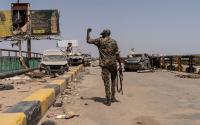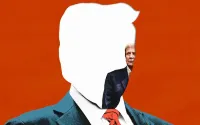Common Dreams / Published on Tuesday, July 15, 2003 by the New York Times
More than half of the U.S. Army's combat strength is now bogged down in Iraq, which didn't have significant weapons of mass destruction and wasn't supporting Al Qaeda. We have lost all credibility with allies who might have provided meaningful support; Tony Blair is still with us, but has lost the trust of his public. All this puts us in a very weak position for dealing with real threats. Did I mention that North Korea has been extracting fissionable material from its fuel rods?
How did we get into this mess? The case of the bogus uranium purchases wasn't an isolated instance. It was part of a broad pattern of politicized, corrupted intelligence.
Literally before the dust had settled, Bush administration officials began trying to use 9/11 to justify an attack on Iraq. Gen. Wesley Clark says that he received calls on Sept. 11 from "people around the White House" urging him to link that assault to Saddam Hussein. His account seems to back up a CBS.com report last September, headlined "Plans for Iraq Attack Began on 9/11," which quoted notes taken by aides to Donald Rumsfeld on the day of the attack: "Go massive. Sweep it all up. Things related and not."
But an honest intelligence assessment would have raised questions about why we were going after a country that hadn't attacked us. It would also have suggested the strong possibility that an invasion of Iraq would hurt, not help, U.S. security.
So the Iraq hawks set out to corrupt the process of intelligence assessment. On one side, nobody was held accountable for the failure to predict or prevent 9/11; on the other side, top intelligence officials were expected to support the case for an Iraq war.
The story of how the threat from Iraq's alleged W.M.D.'s was hyped is now, finally, coming out. But let's not forget the persistent claim that Saddam was allied with Al Qaeda, which allowed the hawks to pretend that the Iraq war had something to do with fighting terrorism.
As Greg Thielmann, a former State Department intelligence official, said last week, U.S. intelligence analysts have consistently agreed that Saddam did not have a "meaningful connection" to Al Qaeda. Yet administration officials continually asserted such a connection, even as they suppressed evidence showing real links between Al Qaeda and Saudi Arabia.
And during the run-up to war, George Tenet, the C.I.A. director, was willing to provide cover for his bosses — just as he did last weekend. In an October 2002 letter to the Senate Intelligence Committee, he made what looked like an assertion that there really were meaningful connections between Saddam and Osama. Read closely, the letter is evasive, but it served the administration's purpose.
What about the risk that an invasion of Iraq would weaken America's security? Warnings from military experts that an extended postwar occupation might severely strain U.S. forces have proved precisely on the mark. But the hawks prevented any consideration of this possibility. Before the war, one official told Newsweek that the occupation might last no more than 30 to 60 days.
It gets worse. Knight Ridder newspapers report that a "small circle of senior civilians in the Defense Department" were sure that their favorite, Ahmad Chalabi, could easily be installed in power. They were able to prevent skeptics from getting a hearing — and they had no backup plan when efforts to anoint Mr. Chalabi, a millionaire businessman, degenerated into farce.
So who will be held accountable? Mr. Tenet betrayed his office by tailoring statements to reflect the interests of his political masters, rather than the assessments of his staff — but that's not why he may soon be fired. Yesterday USA Today reported that "some in the Bush administration are arguing privately for a C.I.A. director who will be unquestioningly loyal to the White House as committees demand documents and call witnesses."
Not that the committees are likely to press very hard: Senator Pat Roberts, the chairman of the Senate Intelligence Committee, seems more concerned about protecting his party's leader than protecting the country. "What concerns me most," he says, is "what appears to be a campaign of press leaks by the C.I.A. in an effort to discredit the president."
In short, those who politicized intelligence in order to lead us into war, at the expense of national security, hope to cover their tracks by corrupting the system even further.






